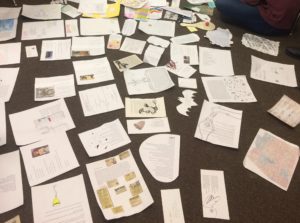 My wife calls them “smallidays”—small holidays, St. Patrick’s Day, Labor Day, Valentine’s Day. Last month, as I glumly removed ornaments and got ready to chuck our tree, she reminded me, “There’s still a bunch of smallidays to look forward to…”
My wife calls them “smallidays”—small holidays, St. Patrick’s Day, Labor Day, Valentine’s Day. Last month, as I glumly removed ornaments and got ready to chuck our tree, she reminded me, “There’s still a bunch of smallidays to look forward to…”
This was little comfort as I haven’t put stock in those holidays since I was a kid. Most years I don’t even remember until I catch someone wearing green, until I’m reminded of an impending three-day weekend, until a student mentions Cupid.
Valentine’s Day feels especially tired, cliché, corporate. Moreover, it’s widely posited that one of my least favorite poets, Chaucer, may have inadvertently “invented” the holiday. (For the record, I also find the ubiquitous “anti-Valentine’s Day” sentiments tired and cliché.)
But the fact is my students think of smallidays. For them, most smallidays feel, well, big.
So this year, I re-calibrated my thinking and started the second semester of Advanced Creative Writing by announcing to my students that for the next month they would be writing one original poem for every single person at our school—including faculty, staff and administration. Not pointedly, that would be impossible, but one, unique poem for each person in our school community, big enough to fit anyone, but particular, precise enough to be a poem.
“What if we make Valentine’s Day bigger than our crushes? Our boyfriends, our girlfriends? Our friends? What if we make Valentine’s Day about connection?”
Instead of recoiling at the magnitude of the task, my students were thrilled. They embraced the idea and for the next four weeks threw themselves into the task of writing approximately three-hundred epistolary, or “Dear You” (as we called them), poems.
They offered advice, spilled their guts, showed (and didn’t tell) love. They revised. And after writing 300-some-odd epistolaries, the students spent weeks migrating the text from their computers to objects—one poem ended up on a paddleboard, some on scrolls, others on maps, others on looseleaf accompanied by doodles, on cardstock with collages, glitter, cut and pasted like ransom notes.
Each poem written was dropped into one of three wicker baskets stashed beneath my desk.
One morning, as I drank my coffee in the static-y silence ahead of the first period bell, I lifted each basket just to feel its heft. Pounds of poetry not bound by the spine of a book. I don’t think I’d ever felt poetry that way, by the pound. Like gold or fruit. Sustenance.
When the day came to give them away, randomly, the students and I felt a twinge of loss. Each poem was its own little work of art. Naturally, the words were preserved on our computers, but the drawings, the threading, the glitter designs, the decoupage—outside of photocopying each one (and we weren’t about to do that), those things had to be let go.
Some people might not see the value in the random gift. They might end up in the recycling bin or, worse yet, the trash. They might be crumpled and forgotten at the bottom of overstuffed backpacks.
But this, also, we understood was part of the undertaking: letting our creations go, distributing our thoughts and efforts out into our little school-world without expectation of acknowledgement, much less reciprocity, and I was reminded of mandalas and my favorite of Auden’s poems: “If equal affection cannot be,/ Let the more loving one be me.”
The day after the poems were distributed, a Friday, we decided to take a day off and settled in together to watch Won’t You Be My Neighbor? the 2018 documentary about Fred Rogers. I felt the story of a man who spent his life trying to connect with others, trying to be the best version of himself, was a fitting film in the wake of our collective undertaking.
I’d just turned down the lights when my classroom door cracked open. I looked up to see our executive director and behind him the dean of the Academy, a few teachers, the school counselors. All had dropped by to personally thank my students for their work. We hadn’t expected this.
As each person spoke of the personal impact the poems had, I watched my students’ faces alight with happy surprise.
Elsewhere, a president was declaring a counterfeit national emergency. Elsewhere, people were trading mean-spirited barbs in a country fractured by political discord. Elsewhere, war. Elsewhere, anger. But there, for a blissful moment, in the closed classroom, adults were thanking young people for poetry, and young people were feeling seen and appreciated.
The world can’t always be this way, but for a few moments, my world, their world, was this way.
Later, we’d learn about Fred Rogers and get teary-eyed together.
And at least for the afternoon, I became decidedly less cynical about smallidays.

